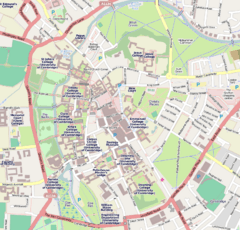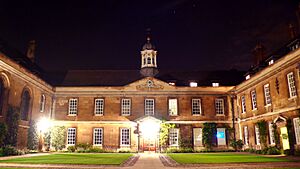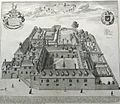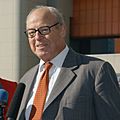Trinity Hall, Cambridge facts for kids
Quick facts for kids Trinity Hall |
||||||||||||
|---|---|---|---|---|---|---|---|---|---|---|---|---|
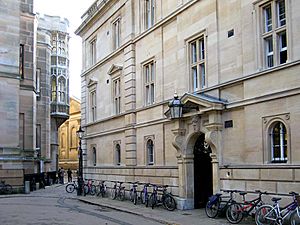
Entrance to Trinity Hall on Trinity Lane
|
||||||||||||
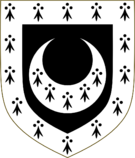
Arms of Trinity Hall
Blazon: Sable, a crescent ermine a bordure (engrailed) of the last |
||||||||||||
|
|
||||||||||||
| University | University of Cambridge | |||||||||||
| Location | Trinity Lane (map) | |||||||||||
| Coordinates | 52°12′21″N 0°06′57″E / 52.2057°N 0.1157°E | |||||||||||
| Full name | The College or Hall of the Holy Trinity in the University of Cambridge | |||||||||||
| Abbreviation | TH | |||||||||||
| Founder | William Bateman, Bishop of Norwich | |||||||||||
| Established | 1350 | |||||||||||
| Named after | The Holy Trinity | |||||||||||
| Sister colleges | ||||||||||||
| Master | Mary Hockaday | |||||||||||
| Undergraduates | 401 (2022-23) | |||||||||||
| Postgraduates | 205 (2022-23) | |||||||||||
| Fellows | 65 | |||||||||||
| Map | ||||||||||||
Trinity Hall is one of the colleges that make up the famous University of Cambridge in England. It's officially called "The College or Hall of the Holy Trinity in the University of Cambridge."
Trinity Hall was founded in 1350, making it the fifth-oldest college still around at the university. It was started by William Bateman, who was the Bishop of Norwich. He wanted to train new clergymen (religious leaders) in canon law after a terrible disease called the Black Death had caused many deaths.
Trinity Hall has two "sister colleges" at the University of Oxford: All Souls and University College.
Many famous people have studied at Trinity Hall. These include the brilliant physicist Stephen Hawking and Nobel Prize winner David Thouless. Other notable alumni include former Prime Ministers like Stanley Bruce (Australia) and Khawaja Nazimuddin (Pakistan), and Canadian Governor General David Johnston. Famous thinkers like Marshall McLuhan and writers like J. B. Priestley also attended. Even an Academy Award-winning actress, Rachel Weisz, studied here!
Contents
History of Trinity Hall
The Black Death in England in the 1340s was a terrible time. It wiped out about half of the population. Bishop Bateman lost almost 700 of his priests. This is why he decided to start a new college: he needed to train more priests.
Bishop Bateman chose a site that was once used by another college called Gonville Hall. It was struggling financially. In 1350, when he founded Trinity Hall, Bishop Bateman said its goal was "the promotion of divine worship and of canon and civil science." This meant the college would be very strong in legal studies, a tradition that continues today.
At first, all colleges in Cambridge were called "Halls" or "Houses." Later, most changed their names to "College." However, when King Henry VIII founded Trinity College right next door, Trinity Hall kept its original name. It's important to remember that it's called Trinity Hall, not Trinity Hall College.
Trinity Hall used to share a church, St John Zacharias, with Clare Hall. But this church was torn down in the 15th century to build King's College. After that, Trinity Hall started using the nearby Church of St Edward, King and Martyr. This connection still exists today.
Buildings at Trinity Hall
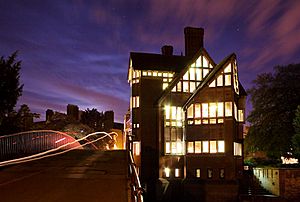
The college is located by the River Cam. Bishop Bateman bought a house from John de Crauden to create the first part of the college. The main area, called Front Court, was built within the first few decades. The old medieval buildings are still there, but their outside look was changed to a more baroque style in the early 1700s.
The Chapel
The Chapel was officially allowed in 1352 and finished by 1366. Its current look comes from a renovation in 1729–30. Old graves were moved, and the walls were decorated with wood panels. The ceiling has the crests (symbols) of past Masters (heads of the college). The Chapel was made longer in 1864. The painting behind the communion table is called Salutation and is on loan from the Fitzwilliam Museum.
The Dining Hall
The Dining Hall was also rebuilt around the same time as the Chapel. Its walls were covered with wood panels, and the old medieval beams were replaced with fancy carvings. A large painting of a former Master, Sir Nathaniel Lloyd, is on the wall. It's said he made sure it couldn't be removed!
Libraries
The college has an old library built in the late 1500s. It holds the college's old manuscripts and rare books. It's one of the few remaining chained libraries in the country, where books were literally chained to the shelves to prevent theft.
The newer Jerwood Library was opened in 1999. It overlooks the river and holds the college's modern book collection.
Other College Areas
Trinity Hall also owns other buildings in Cambridge, including some on Bateman Street and Thompson's Lane. It also has a site called Wychfield, near Fitzwilliam College. This is where most of the college's sports activities happen. Mary Hockaday became the new Master of Trinity Hall in September 2022.
Student Life
Students at Trinity Hall have different common rooms where they can relax and socialize. Undergraduates (students doing their first degree) have the Junior Combination Room (JCR). Postgraduate students (those doing advanced degrees) have the Middle Combination Room (MCR). Both have active committees that plan fun events for their members.
Societies and Clubs
Students at Trinity Hall can join many different clubs and societies.
Trinity Hall Boat Club
The Boat Club is the oldest and largest club at Trinity Hall. It was started in 1827. The club has a very proud history, especially in rowing races. From 1890 to 1898, the college's team stayed "Head of the Mays" for 33 days in a row. This is still the longest time any club has held that top spot! In 1887, the college won almost every event at the Henley Royal Regatta, making it the most successful Cambridge college in that event's history. The club's boathouse was built in 1905 and is on the River Cam, close to the college.
Hesperides Literary Society
The Hesperides is Trinity Hall's literary society. It was founded in 1923 to discuss books and art. Famous writers like T. S. Eliot and J. B. Priestley attended its early dinners. The society stopped meeting in 1976 but was restarted in 2020 to encourage more literary activities.
Gallery
-
T.H.B.C. Club-House on the River Cam
People from Trinity Hall
Masters
The Master is the head of the college. The current Master is Mary Hockaday, who started in September 2022.
Notable Alumni
Many well-known people have studied at Trinity Hall. Here are some of them:
-
Charles Howard, 1st Earl of Nottingham, a famous admiral
-
J. B. Priestley, a well-known novelist and playwright
-
Marshall McLuhan, a Canadian philosopher
-
Geoffrey Howe, a former Deputy Prime Minister
-
Hans Blix, a Swedish diplomat
-
David Johnston, former Governor General of Canada
-
Stephen Hawking, the famous physicist
-
Guy Scott, former President of Zambia
-
Andrew Marr, a journalist and broadcaster
-
Rachel Weisz, an Oscar-winning actress
-
Emma Pooley, an Olympic silver-medallist cyclist
-
Tom James, a double Olympic gold-medallist rower
- Robert McNeill Alexander – a zoologist (someone who studies animals)
- Zafar Ansari – a cricketer for England
- Hans Blix – former UN Chief Weapons Inspector
- Edward Carpenter – a socialist poet
- Stephen Hawking – a famous physicist
- Robert Herrick – a poet
- Charles Howard, 1st Earl of Nottingham – a famous admiral
- Geoffrey Howe – a former politician
- Nicholas Hytner – a theatre and film director
- Tom James – an Olympic gold medallist in rowing
- David Johnston – former Governor General of Canada
- Vladimir Kara-Murza – a Russian author and political prisoner
- Donald Maclean – a Soviet spy
- Andrew Marr – a political journalist
- Marshall McLuhan – a media theorist
- Khawaja Nazimuddin – Pakistan's second Prime Minister
- Emma Pooley – an Olympic silver medallist in cycling
- J.B. Priestley – a well-known writer
- David Sheppard – a bishop and cricketer
- Leslie Stephen – a Victorian writer
- David J. Thouless – a theoretical physicist and Nobel Prize winner
- Mark Tully – a BBC radio broadcaster
- Terry Waite – a humanitarian and author
- Rachel Weisz – an Academy Award-winning actress
- Sophie Winkleman – an actress
See also
 In Spanish: Trinity Hall para niños
In Spanish: Trinity Hall para niños


